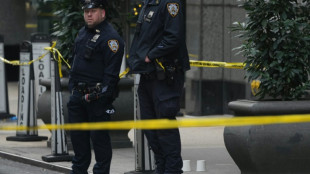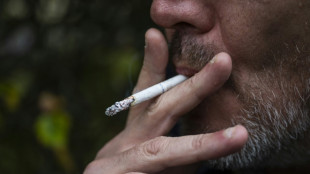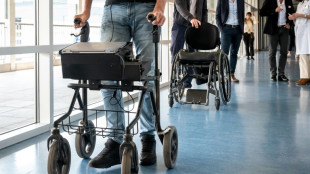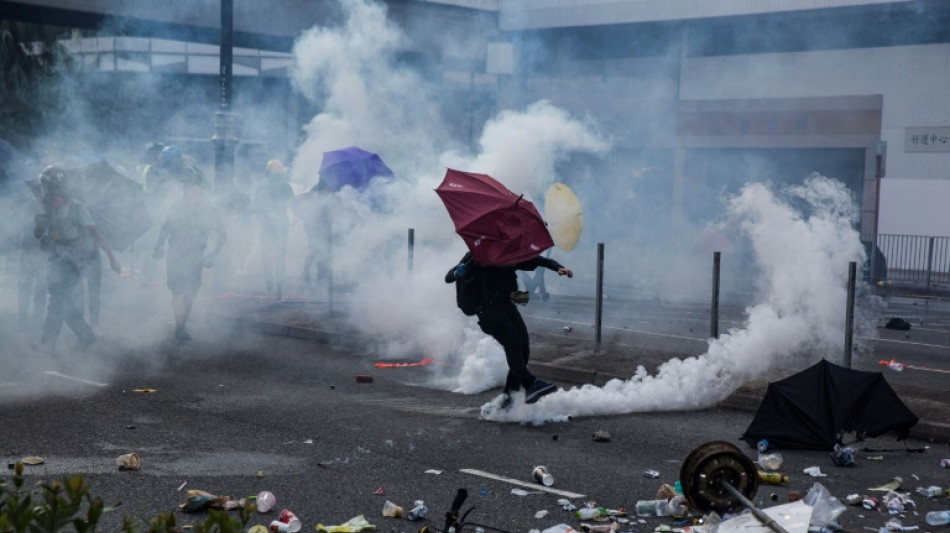
-
 South Korea president clings to power after martial law U-turn
South Korea president clings to power after martial law U-turn
-
Presidential vote seen as referendum on Romania's European future

-
 Hamilton bids farewell to Mercedes as Ferrari vie for title
Hamilton bids farewell to Mercedes as Ferrari vie for title
-
New Zealand unchanged in bid to hit back against England

-
 Macron seeks remedy to France's political crisis
Macron seeks remedy to France's political crisis
-
New Natalia Lafourcade album celebrates music's onstage evolutions

-
 Taiwan's Lai kicks off visit to US territory Guam
Taiwan's Lai kicks off visit to US territory Guam
-
Ivory Coast staple cassava meal gains UNESCO heritage status
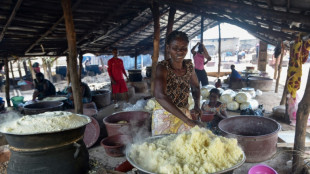
-
 OpenAI to partner with military defense tech company
OpenAI to partner with military defense tech company
-
Liverpool held but Slot salutes 'special' Salah

-
 Man City needed to break losing 'routine', says Guardiola
Man City needed to break losing 'routine', says Guardiola
-
Leipzig down Frankfurt to reach German Cup quarters, Cologne strike late

-
 Mbappe admits penalty miss 'big mistake' as Bilbao beat Real Madrid
Mbappe admits penalty miss 'big mistake' as Bilbao beat Real Madrid
-
'Sad, disappointed' Mbappe pays penalty as Bilbao beat Real Madrid

-
 US stocks surge to records, shrugging off upheaval in South Korea, France
US stocks surge to records, shrugging off upheaval in South Korea, France
-
Liverpool held in Newcastle thriller, Arsenal inflict Amorim's first defeat

-
 Shiffrin confirms she'll miss Beaver Creek World Cup races
Shiffrin confirms she'll miss Beaver Creek World Cup races
-
Corner kings Arsenal beat Man Utd to close gap on Liverpool

-
 Mbappe pays penalty as Bilbao beat Real Madrid
Mbappe pays penalty as Bilbao beat Real Madrid
-
NFL Jaguars place Lawrence on injured reserve with concussion

-
 North Korea, Russia defence treaty comes into force
North Korea, Russia defence treaty comes into force
-
Openda hits brace as Leipzig beat Frankfurt in German Cup last 16

-
 Schar punishes Kelleher blunder as Newcastle hold Liverpool in thriller
Schar punishes Kelleher blunder as Newcastle hold Liverpool in thriller
-
De Bruyne masterclass helps Man City end seven-game winless streak

-
 Syrian rebels surround Hama 'from three sides', monitor says
Syrian rebels surround Hama 'from three sides', monitor says
-
Lawyers seek leniency for France rape trial defendants, blaming 'wolf' husband

-
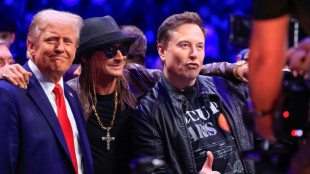 OpenAI chief 'believes' Musk will not abuse government power
OpenAI chief 'believes' Musk will not abuse government power
-
Thousands rally in Georgia after police raid opposition offices

-
 S. Korea opposition push to impeach president
S. Korea opposition push to impeach president
-
Powell 'not concerned' US Fed would lose independence under Trump

-
 French government falls in historic no-confidence vote
French government falls in historic no-confidence vote
-
Syrian White Helmets chief 'dreams' of never pulling a body out of rubble again

-
 NBA Suns lose Durant for at least a week with ankle injury
NBA Suns lose Durant for at least a week with ankle injury
-
Warhammer maker Games Workshop enters London's top stocks index

-
 Iran Nobel winner released for three weeks, 'unconditional' freedom urged
Iran Nobel winner released for three weeks, 'unconditional' freedom urged
-
Red Cross marks record numbers of humanitarians killed in 2024

-
 Johnson's Grand Slam 'no threat', says World Athletics boss Coe
Johnson's Grand Slam 'no threat', says World Athletics boss Coe
-
Qatar's emir and UK's Starmer talk trade as state visit ends

-
 Cuba suffers third nationwide blackout in two months
Cuba suffers third nationwide blackout in two months
-
Russia, Ukraine to send top diplomats to OSCE summit in Malta

-
 Spanish royals to attend memorial service for flood victims
Spanish royals to attend memorial service for flood victims
-
LPGA, USGA new policy requires female at birth or pre-puberty change

-
 Stick to current climate change laws, US tells top UN court
Stick to current climate change laws, US tells top UN court
-
British Museum chief says Marbles deal with Greece 'some distance' away

-
 Pope Francis receives electric popemobile from Mercedes
Pope Francis receives electric popemobile from Mercedes
-
Gaza civil defence: thousands flee Israeli strikes, evacuation calls

-
 Trump names billionaire private astronaut as next NASA chief
Trump names billionaire private astronaut as next NASA chief
-
Pidcock to leave INEOS Grenadiers at end of season

-
 Seoul stocks weaken, Paris advances despite political turmoil
Seoul stocks weaken, Paris advances despite political turmoil
-
South America summit hopes to seal 'historic' trade deal with EU


Hong Kong more unequal, less free as Carrie Lam leaves office
Hong Kong has emerged a more unequal city, its freedoms curtailed and international shine dulled after five years with Carrie Lam at the helm, analysts say, as her turbulent leadership draws to an end.
Lam, Hong Kong's first woman leader, took office promising to heal divisions and tackle livelihood issues, especially a housing crisis.
Her term was instead dominated by massive democracy protests and Beijing's subsequent crackdown, as well as a zero-Covid pandemic strategy that kept the city isolated while rivals reopened.
She is on track to depart at the end of June with the lowest approval ratings of any leader since the handover from Britain.
In her final policy address last October, Lam described Hong Kong as "much stronger than ever" after China intervened to ensure stability.
Her government survived the mass protest movement, but many say she failed to deliver on life improvement pledges -- which even China's leadership says are at the heart of the city's "deep-rooted social conflicts".
Last year, 1.65 million Hong Kongers -- nearly one in four -- were living below the government's official poverty line, which for a one-person household means HK$4,400 ($560) a month.
This was the highest level since records began 12 years ago.
"The grassroots have been very neglected," said Sze Lai-shan, deputy director of the Society for Community Organization.
"Sometimes it feels like (the government) is living on a different planet."
Even pro-establishment figures have been unimpressed.
"You may say (Lam) has been working very hard, but little has been achieved in solving the deteriorating livelihood issues and Hong Kong's deep-rooted conflicts," senior Beijing advisor Lau Siu-kai told AFP.
- World's most expensive property -
Last July, China's top official on Hong Kong affairs Xia Baolong gave a speech widely seen as a reflection of Beijing's growing impatience with the housing crisis, something every leader since the 1997 handover has failed to solve.
The city, Xia said, must "say goodbye" to cage homes and the tiny shared apartment rooms where some 220,000 Hong Kongers still dwell.
Hong Kong has long held the title of the world's most unaffordable housing market, where a study this year showed the median property price is 23 times the median household income.
Lam increased public housing supply, more than her predecessors, but demand still outstripped supply with the wait time increasing to six years.
Chan Kim-ching, a land-use researcher at the Liber Research Community, said Lam overly prioritised building flats to buy.
"By putting home ownership as the goal, it exacerbated the wealth inequality in society," Chan told AFP.
"(Lam's) policies do not target those in the greatest need. There is a mismatch."
- Exodus -
The last two years of Lam's term also witnessed a historic outflow of people -- fleeing either the political crackdown or some of the world's strictest pandemic controls.
The departures surged further this year when Hong Kong's zero-Covid policy collapsed as the more transmissible Omicron variant broke through, killing more than 9,000 people, mostly under-vaccinated elderly.
A net 160,000 people departed Hong Kong in the first three months of the year.
Lam recently acknowledged that the curbs had caused a brain drain among foreign businesses, saying it was an "undeniable fact".
Meanwhile, Beijing's ongoing efforts to reshape Hong Kong's political landscape sparked another emigration wave among locals.
After the 2019 protests were crushed, China imposed a sweeping national security law that criminalised dissent and transformed the once outspoken city.
Police arrested 182 people under the security law. Most of the city's prominent democracy activists are either in jail or have fled overseas.
In the annual international press freedom chart released this week by Reporters Without Borders, Hong Kong plummeted from 80th to 148th place.
Frances Hui, an activist granted asylum in the United States, described Lam as an "obedient enforcer" of Chinese leader Xi Jinping's agenda.
"She accelerated the suppression of freedoms," Hui told AFP.
The Hong Kong diaspora is steadily growing in places like Britain, Canada and the United States.
"I didn't expect that taking part in activism will lead to me having to seek asylum," Hui said.
"That's a reflection of how far Hong Kong has fallen."
C.Kovalenko--BTB

